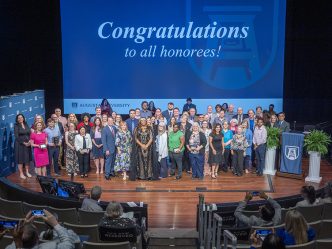According to Dr. Wayne Lord, Associate Dean of Georgia Regents University’s College of Education, the newly created doctoral degree in educational innovation is generating a lot of attention.
“We recently had 18 applicants on campus for interviews and to participate in a writing exercise,” Lord said. “The folks we interviewed are very excited about the possibilities and intrigued by the design of the program and the fact that it’s about making a difference. They see it as purposeful.”
The Educational Innovation EdD is the first doctoral program in the College of Education and the university’s first doctoral program outside of health and medicine. Lord said they initially considered offering a PhD, but after consolidation, the focus shifted toward an EdD.
“We are approaching this as a practitioner’s degree, trying to better prepare those who are already working in educational settings and to help them perform even more efficiently,” he said. “So we’re not really trying to prepare them to be researchers who are going to focus on or develop theories. As much as their hands are already dirty with the work, we’re trying to see how they can get their hands dirtier.”
Lord said that by focusing on real problems of practice, the EdD program will help groom the educational leaders of tomorrow to influence from within.
“It’s not really preparing folks to transition to another career,” he said. “It really is to focus on wherever your educational setting is so that people can work and effect change at that level.”
Because the program will be asking local school districts for input about the problems they are facing while also working with them to develop solutions, some are calling this a consultancy approach, which is fine by Lord.
“This is kind of at the heart of what we’re doing,” he said. “The personal growth and development that occurs while completing the doctoral program is great for the individual, but what’s the so what? Through our doctoral program, we’re trying to prepare educators who will be able to deliver on the so what.”
The program is modeled after the strong program put together at Vanderbilt.
“They have folks from all over the country who fly in on weekends,” Lord said. “So we’ve tried to steal and borrow from the best.”
Consequently, the program will follow a cohort approach, with the 12 to 15 students working together. The belief among those at GRU is that change in education is facilitated when people are able to collaborate.
“That’s kind of the hidden curriculum inside our program,” he said. “The cohort size is intentional because a lot of the work they’re going to do is going to be done in groups and those groups will be changing, so they’re going to have to transfer those interpersonal skills and learn about other people and what their work habits are like, because that’s what it’s like in the real world.”
Not only will they be working in groups throughout the program, but their dissertation in practice will be a collaboration as well.
Another plus, especially given the current financial pressures: The new program is kicking off without the addition of any new faculty.
Offers of admission will go out in April, and classes will start in May.
 Augusta University
Augusta University



